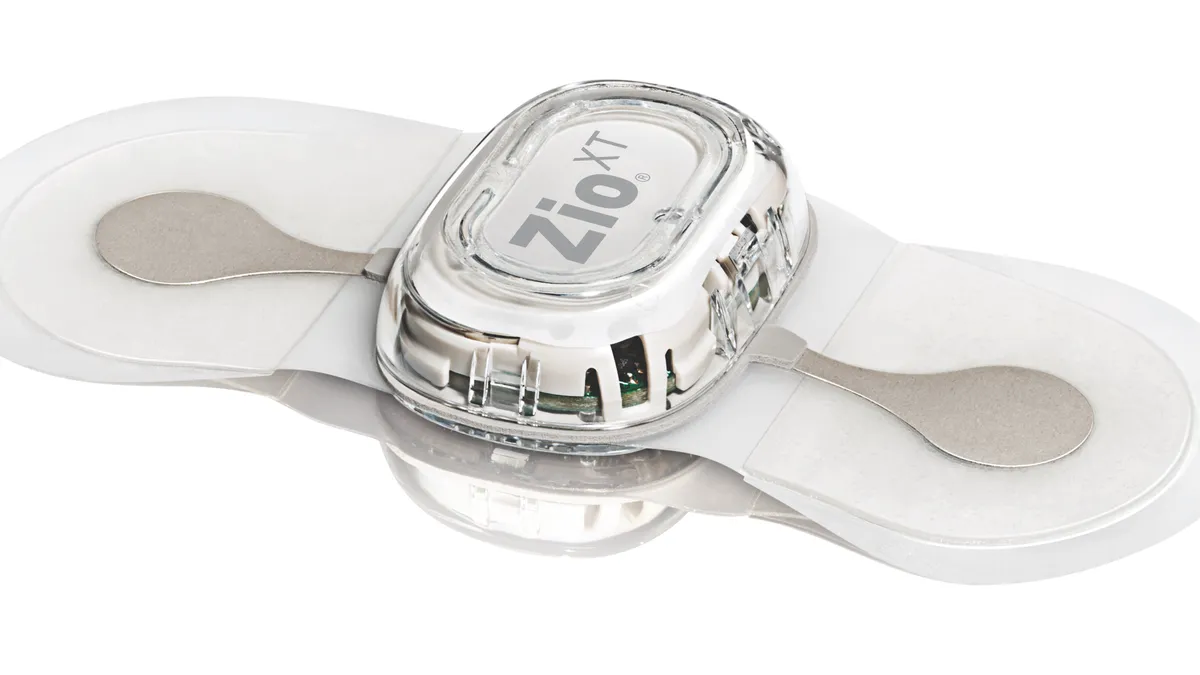Dive Brief:
- Novitas Solutions more than doubled certain Medicare rates for cardiac monitoring in 2022, handing iRhythm Technologies a much-needed boost after the company struggled throughout most of last year.
- Novitas, a regional Medicare rate setter, posted new prices for several extended cardiac monitoring Medicare codes Monday. For cardiac monitor usage between seven to 15 days, the main code used by iRhythm, Novitas set the reimbursement rate at roughly $233, up from the $115 rate set in April. The rate for monitoring between 48 hours and 7 days was also set at $223, up from $103.
- iRhythm CEO Quentin Blackford praised the increases in a Monday statement, thanking Novitas and other Medicare Administrative Contractors (MACs) for "their continued engagement and efforts to better understand long-term continuous ECG monitoring, the clinical benefits that it provides to patients and the costs and resources that go into delivering the service." The company's stock price was up 27.5% when the market closed Monday and up nearly 10% Tuesday morning.
Dive Insight:
The Medicare pricing saga had a significant impact on iRhythm in 2021 and also affected the broader cardiac monitoring submarket. Novitas cut Medicare rates for extended external monitoring to a range between $40 to $50 in January 2021 after CMS passed on setting a national price for the devices and services in December 2020. The MAC eventually upped the reimbursement rate for iRhythm's primary code to $115 in April, but this was still nearly $200 below historic pricing.
The rate cut cast uncertainty over the space as Wall Street and companies in the cardiac monitoring market questioned whether Novitas' lower rates would be permanent or whether CMS would ultimately set a higher national price. iRhythm's stock price was thrown into a downward spiral for much of last year, falling sharply after the initial rate cut and then again in April.
Amid the turmoil, then-CEO Mike Coyle stepped down in June after roughly four months on the job; Blackford eventually took over the position in October.
With no clear sign from Novitas or other MACs that rates would be meaningfully altered, one option left was for CMS to finalize national pricing in the Physician Fee Schedule. But the agency, once again, passed on the decision in November.
CMS did give a glimpse at where a future price may end up, however. In the final rule, CMS "finalized" a supply cost of $200.15, even though it did not finalize national pricing. The move still left 2022 pricing decisions with Novitas and other MACs.
Blackford told MedTech Dive in November that iRhythm would continue to work with the MACs and CMS to get a price increase for 2022 and, eventually, a national rate.
The more than double rate from Novitas may have taken some by surprise. J.P. Morgan analysts wrote Monday that negotiations with Novitas were expected to take longer. The analysts also said that there was a chance any meaningful rate changes would not come until 2023 if CMS were to finalize national pricing.
Baird analyst Mike Polark did note that the market "has been building in roughly a $200 placeholder for the Medicare rate" following the supply cost put out by CMS.
William Blair analysts projected that the new rates could create a revenue upside of $55 million and $58 million for 2022 and 2023, respectively.
"While still below pre-2020 rates of $311, we believe a $233 CMS rate would be a viable and profitable rate that would help give more confidence in the long-term viability of the extended holter market and ease concerns on future pricing headwinds (both private and public reimbursement pricing)," the analysts wrote.
If the new rates were applied in 2021, it would equate to an approximately 10% increase in total revenue for iRhythm, according to the company's Monday statement.
iRhythm is not the only company in the space to benefit. Between December 2020 and early 2021, there was an M&A run in cardiac wearables, with nearly all of iRhythm's competition being picked up by larger medtechs.
Philips bought BioTelemetry for $2.8 billion in December 2020, and Boston Scientific spent $925 million on Preventice in January 2021. Hillrom also agreed to acquire Bardy Diagnostics in January 2021 for $375 million; however, Hillrom was then acquired by Baxter later in the year.
More details on the rate changes and the impact on iRhythm will likely be given Tuesday afternoon when the company presents at the J.P. Morgan healthcare conference.











